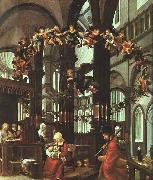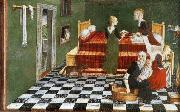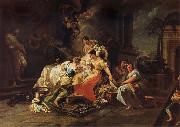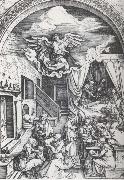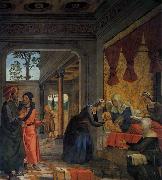
|
Albrecht Altdorfer
|
|||
|
|
|||
| German 1480-1538 Albrecht Altdorfer Galleries He most often painted religious scenes, but is mainly famous as the first frequent painter of pure landscape, and also compositions dominated by their landscape. Taking and developing the landscape style of Lucas Cranach the Elder, he shows the hilly landscape of the Danube valley with thick forests of drooping and crumbling firs and larches hung with moss, and often dramatic colouring from a rising or setting sun. His Landscape with footbridge (National Gallery, London) of 1518-20 is claimed to be the first pure landscape in oil. He also made many fine finished drawings, mostly landscapes, in pen and watercolour. His best religious scenes are intense, sometimes verging on the expressionistic, and often depict moments of intimacy between Christ and his mother, or others. His most famous religious artwork is the The Legend of St. Sebastian and the Passion of Christ that decorated the altar in the St. Florian monastery in Linz, Austria. He often distorts perspective to subtle effect. His donor figures are often painted completely out of scale with the main scene, as in paintings of the previous centuries. He also painted some portraits; overall his painted oeuvre was not large. | |||
|
|
|||
|
The Birth of the Virgin Albrecht Altdorfer9.jpg Painting ID:: 2294 |
1525 Pinakothek, Munich | ||
|
|
|||
|
unknow artist
|
|||
|
|
|||
|
|
|||
|
The birth of the virgin new12/unknow artist-798282.jpg Painting ID:: 39425 |
mk146 Italian Schule,15.Jh. Anna mounted washed becomes itself in bed during (in the foreground) the wrapped baby Maria by a nurse | ||
|
|
|||
|
Corrado Giaquinto
|
|||
|
|
|||
| 1703-1766 Italian Corrado Giaquinto Galleries He was born in Molfetta. As a boy he apprenticed with a modest local painter Saverio Porta, (c1667-1725), escaping the religious career his parents had intended for him. By October 1724, he left Molfetta, and along with his contemporaries Francesco de Mura (1696-1784) and Giuseppe Bonito (1707-1789), he trained from 1719-23 in the prolific Neapolitan studio of Francesco Solimena, either with Solimena or his pupil, Nicola Maria Rossi. Throughout his life, Giaquinto was a peripatetic painter, with long sojourns in Naples, Rome (between 1723-53), Turin (1733 and 1735-9), and Madrid (1753-1761). In 1723, he moved to Rome to work in the studio of Sebastiano Conca. He painted in San Lorenzo in Damaso, San Giovanni Calibita, and the ceiling at Santa Croce in Gerusalemme. In March 1727, with Giuseppe Rossi as an assistant, Giaquinto opened an independent studio near the Ponte Sisto, in the parish of Saint Giovanni of the Malva in Rome. In 1734, he married Caterina Silvestri Agate. The first documented work by his hand is Christ crucified with the Madonna, Saint John Evangelist, and Magdalene commissioned in 1730 by king John V of Portugal for the cathedral of the Mafra. In 1731, he received a prestigious commission, to execute frescoes in the church of San Nicola dei Lorenesi: Saint Nicholas water gush from cliff, three theologic and cardinal Virtues, and in the cupola Paradise. The latest restoration confirms Giaquinto stylistic independence from Solimena, and reveals his stylistic dependence on Luca Giordano. | |||
|
|
|||
|
The birth of the Virgin new16/Corrado Giaquinto-656628.jpg Painting ID:: 42055 |
mk166 1753 I Wave sbre cloth 72x103cm Uffizi, Florence | ||
|
|
|||
|
Albrecht Durer
|
|||
|
|
|||
| b.May 21, 1471, Imperial Free City of Nernberg [Germany] d.April 6, 1528, Nernberg Albrecht Durer (May 21, 1471 ?C April 6, 1528) was a German painter, printmaker and theorist from Nuremberg. His still-famous works include the Apocalypse woodcuts, Knight, Death, and the Devil (1513), Saint Jerome in his Study (1514) and Melencolia I (1514), which has been the subject of extensive analysis and interpretation. His watercolours mark him as one of the first European landscape artists, while his ambitious woodcuts revolutionized the potential of that medium. D??rer introduction of classical motifs into Northern art, through his knowledge of Italian artists and German humanists, have secured his reputation as one of the most important figures of the Northern Renaissance. This is reinforced by his theoretical treatise which involve principles of mathematics, perspective and ideal proportions. His prints established his reputation across Europe when he was still in his twenties, and he has been conventionally regarded as the greatest artist of the Renaissance in Northern Europe ever since. | |||
|
|
|||
|
The Birth of the virgin new16/Albrecht Durer-876572.jpg Painting ID:: 42436 |
mk168 297x210mm | ||
|
|
|||
|
Juan de Borgona
|
|||
|
|
|||
| Spanish Painter, ca.1470-1534 was a High Renaissance painter who was born in the Duchy of Burgundy, probably just before it ceased to exist as an independent state, and was active in Spain from about 1495 to 1534. His earliest documented work was painted in 1495 for the cloister of the Cathedral of Toledo. Borgoña??s compositions are well balanced with finely drawn figures in elegant, tranquil poses. They are set either against open spaces leading on to craggy landscapes or against gold embroidered drapery. There were a number of foreign painters active in Spain in this period, including Juan de Flandes. Borgona??s students include Pedro de Cisneros the Elder (died 1546), Antonio de Comontes (ca. 1500-1519), | |||
|
|
|||
|
The Birth of the Virgin new19/Juan de Borgona-894594.jpg Painting ID:: 52604 |
Virgin 1509-11 Fresco Chapter room | ||
|
|
|||
|
Also Buy::. For Following Paintings / Artists / Products, Please Use Our Search Online: |






